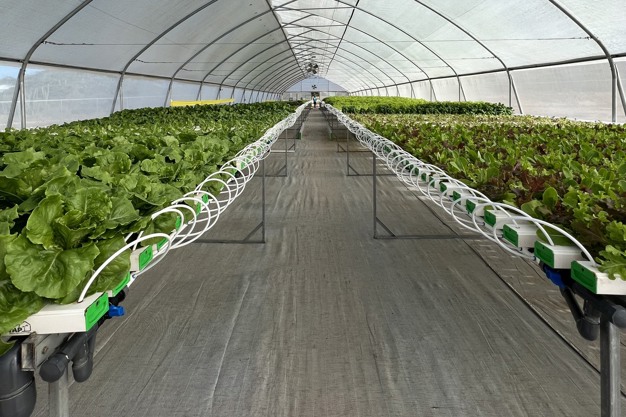Aruba, known for its pristine beaches and contagious tourism industry, is also home to an evolving agricultural drive aimed at reshaping the island's food production. 297 Farm is dedicated to cultivating high-quality, locally grown leafy greens. It has been a big journey for them in the country with some challenges and many more opportunities for the future of farming in Aruba and the Caribbean region.
New ideas with TAPKIT
In 2021, 297 Farm purchased their first TAPKIT, a highly efficient, greenhouse-based system for growing leafy greens from Israel. Reflecting on their introduction to the system, Shareholder of 297 Farm, Gregory Fung-A-Fat shared, "Our first TAPKIT system was set up to cultivate leafy greens, particularly lettuce, and has been a game changer. The system has allowed us to optimize our production process and meet the growing demand for fresh, locally grown produce."
The farm's specialization in leafy greens is part of a broader mission to bring sustainable agriculture to Aruba. As they look toward the future, 297 Farm aims to expand its operations into vine crops, diversifying local produce types.

The expansion: meeting growing local demand
With the success of their first TAPKIT system, 297 Farm is now in the final stages of constructing a second greenhouse. This expansion comes in response to an overwhelming increase in demand. "We're setting up our second TAPKIT greenhouse to be operational before the peak season," Gregory explained. "Demand has outpaced our current production capacity, and as we grow, we need more space and resources to meet the needs of both the local and tourism markets."
The farm has an ambition to support Aruba's food security while also capitalizing on the lucrative tourism industry. By producing locally, they reduce reliance on imports and ensure a fresher, more sustainable food supply for the island.
A smooth transition to greenhouse farming
Transitioning from their original indoor farming model (Cropbox) to a 500m² TAPKIT greenhouse presented challenges, but 297 Farm found the shift to be smoother than expected. "Thanks to the support from the TAPKIT team, we were able to adapt quickly to the new environment," Gregory noted. The greenhouse has allowed them to scale production effectively, taking their farming capabilities to the next level.
A variety of lettuce for all preferences
297 Farm has a diverse array of lettuce they produce. "Our best-selling variety is Batavia, but we grow eight different types of lettuce, all from high-quality Rijk Zwaan seeds," Gregory shared. This variety allows them to cater to a wide range of culinary preferences, whether for local residents or high-end restaurants serving tourists. The focus on quality and variety has helped the farm establish a strong reputation in both markets.
Supporting the island's food security
While tourism is a driving force behind much of Aruba's economy, 297 Farm is committed to supporting the local market just as much as the tourism industry. "Aruba's economy is strong, and tourism continues to grow. However, 297 Farm is equally dedicated to providing fresh, locally grown produce to residents," Gregory emphasized. The farm's dual focus ensures that locals benefit from healthier, more sustainable food options, while also supporting the island's overall food security by reducing dependence on imported goods.
Challenges: energy and labor
Like many farmers in the Caribbean, 297 Farm faces significant challenges, particularly with electricity supply and labor availability. "Reliable energy is crucial for maintaining optimal conditions in the greenhouse," Gregory explained. Aruba's energy infrastructure can sometimes be inconsistent, which presents challenges for maintaining the precise conditions necessary for hydroponic farming systems.
Labor, too, is an ongoing issue. "Finding skilled labor can be difficult on the island," he noted. This challenge isn't unique to Aruba but is common across the region. These hurdles lead to innovative thinking and optimization, having to obtain maximal production output from minimal labor input.
Opportunities for Farming in the Caribbean
Looking beyond Aruba, the farm sees more potential for agriculture across the Caribbean. Many islands, including Aruba, face challenges related to food security and heavy reliance on imported goods. "There is a tremendous opportunity for collaboration and innovation across the region," Patricia, Managing Director at 207 Farm, shared. "By working together, Caribbean nations could reduce their reliance on imports and create more self-sufficient agricultural systems, improving food security for the entire region."

Patricia Mitton, Managing Director at 207 Farm
Promoting sustainability through United Farmers Aruba
In addition to 297 Farm, Gregory is also deeply involved in promoting sustainable agriculture through his work with United Farmers Aruba & EU PHITO project. "I currently serve as a board member for United Farmers Aruba, a fantastic organization dedicated to promoting sustainable urban farming," he said. The organization plays a critical role in advocating for a resilient local food system and addressing broader concerns around food security and sustainability, not just for Aruba but for the region as a whole.
PHITO is part of the Horizon Europe funding program for research and innovation. PHITO is currently developing an app addressing farmers' needs, especially those of SMFs. Gregory explained that "by developing a low-barrier, inclusive, and affordable app that translates geo-data into actionable farming advice, they are shaping a sustainable, inclusive, and collaborative future for agriculture".
297 Farm focuses holistically on innovation, sustainability, and community impact. With ongoing challenges like energy and labor, there is still much work to be done, but the opportunities for growth and collaboration across the Caribbean offer hope for a future where islands like Aruba are less dependent on imported food and more capable of producing their own.
For more information:
Gregory Fung-A-Fat
United Farmers Aruba
Tel.: +297 732 3388
[email protected]
https://www.facebook.com/UFAruba/
